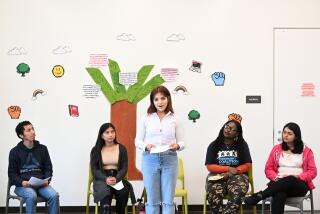HIGH LIFE / A WEEKLY FORUM FOR HIGH : Honor Bright : IB Program Asks a Lot--And Students Deliver
- Share via
Homework versus sports practice. Research papers versus a part-time job. Studying for exams versus a good night’s sleep. International Baccalaureate versus a “normal” curriculum.
For 300 Sunny Hills High School students, the choice was for homework, research papers and studying--all major components of the International Baccalaureate program, a comprehensive and rigorous four-year honors program offered at the Fullerton school.
Candidates for a diploma in the IB program must demonstrate mastery of six subject areas, write a 5,000-word essay, volunteer 100 hours in their communities and enroll in a “Theory of Knowledge” course in addition to their normal high school classes and duties.
The choice to tackle the IB program can be a difficult one.
Atul Saran, a senior enrolled in IB, said students shouldn’t get involved with the program just “because you’ve always been in honors classes, or your parents are pushing you, or because all of your friends are. You need to do it because you will enjoy the challenge.”
And a challenge it most certainly is. A senior’s typical IB schedule will include a double-period advanced biology class, a course in advanced philosophy known as “Theory of Knowledge” and four or five additional honors courses.
Many IB students find themselves at school for eight hours a day and then face an additional four to five hours of homework each night.
An international program based in Geneva, Switzerland, IB includes 400 schools in 55 countries, with about 20 California schools participating. Locally, Canyon, Fullerton, Laguna Hills, Mission Viejo, Sonora, Troy and Sunny Hills high schools offer IB as an option.
Although the screening process for candidates varies from school to school, the curriculum is international.
The IB program satisfies “the need for more international awareness,” said Ron Woerner, IB coordinator at Sunny Hills. “It insists on fluency in two languages, emphasizes the study of world literature and a knowledge of other people.”
Because it is a relatively new program--established 20 years ago in Europe and brought to California about “eight or nine years ago,” Woerner said--there is some controversy over its use as a tool for helping students gain admission to college.
“The IB program is no guarantee of college admittance, but it can be an advantage,” Woerner said. “The curriculum itself is very valuable.” The program teaches time management and study skills vital to a successful college career, he added.
IB differs from Advanced Placement classes by providing a “complete program,” Woerner said. “IB forces a student to test in all areas and has elements, such as the community service requirement, which are outside of the classroom. AP is not a program, it’s a series of individual classes.”
Despite the workload, students enjoy the program for a variety of reasons.
“I like to take the most challenging classes possible,” Saran said. “School is boring unless you can feel the satisfaction of tackling the toughest the school has to offer.”
Sunny Hills senior Paul Park, an IB diploma candidate, added: “I’ve been in the program for three years and made the commitment. As I see it, I might as well go through with it. Plus, it is kind of like a privilege.”
Some students, however, don’t see IB as worth their time or effort.
“The time I spent on IB could have been more useful doing other stuff, such as working at the boys’ club, (playing) varsity basketball and volunteering at the animal hospital,” said Chat Chuenrudeemol, a senior who chose to drop out of the IB program.
And Chuenrudeemol is not alone. Within the first two weeks of the beginning of school, a number of students, including 15 of 55 seniors, dropped out of the Sunny Hills IB program. Although some dropped due to poor grades, the majority did so for other reasons.
Senior Harini Krishnan, who chose not to continue, said she can take on a challenging curriculum, one that reflects her personal interests, without the additional pressures of IB.
“I am still taking all hard classes,” she said, “but instead of taking AP/IB Biology, I’m taking AP French Literature.”
Such complaints have not stopped nearly 90 freshmen and sophomores from signing up for the honors classes.
“The IB program makes our school special,” said Louie Cheng, a sophomore who said his parents encouraged him to join. “It will look good for college.”
Sophomore Terry Mann, who said he joined IB because most of his friends are involved, said, “I qualified for it, so I decided to try it.”
To qualify for the program, students must pass language usage, writing sample and algebra tests. Also, their junior high grade-point average, rank on national exams and teacher comments are also considered.
Woerner said he was surprised at the decision of some of the seniors to drop IB. “I don’t resent them dropping the program,” he emphasized, “but when a student sits in my office and cries, it may not be in their best interest.
“Some of the students are going to wind up in two or three months really feeling sorry,” he said. “I have some concern that students may be making their decision on shaky sources of information. Often students who have graduated and not been successful in the program will portray it in a negative light.”
Also, Woerner said, if students don’t know whom to contact at a given college, they may falsely conclude that the college does not recognize the IB program.
Due to the experiences and attitudes Woerner has recently encountered as students dropped out of IB, he said he has re-evaluated his philosophy toward the program.
When he began implementing IB four years ago, he said he thought “the ultimate goal in the IB program was to earn the diploma. This is what I stressed and what I sold.
“Now, the No. 1 value of being in the IB program is doing the IB program.”
More to Read
Get our high school sports newsletter
Prep Rally is devoted to the SoCal high school sports experience, bringing you scores, stories and a behind-the-scenes look at what makes prep sports so popular.
You may occasionally receive promotional content from the Los Angeles Times.






